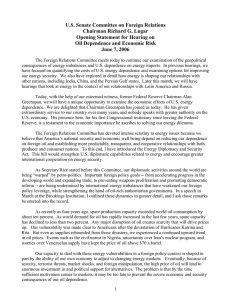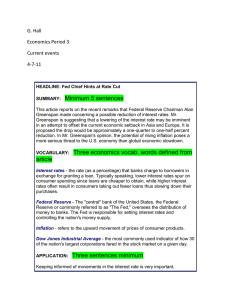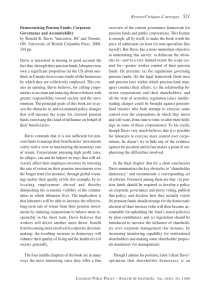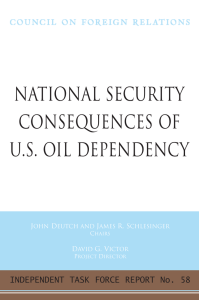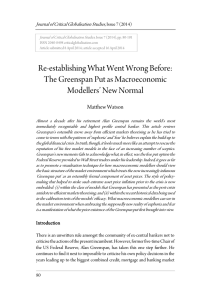Opening Statement of Senator Joseph R. Biden, Jr. June 7, 2006
advertisement
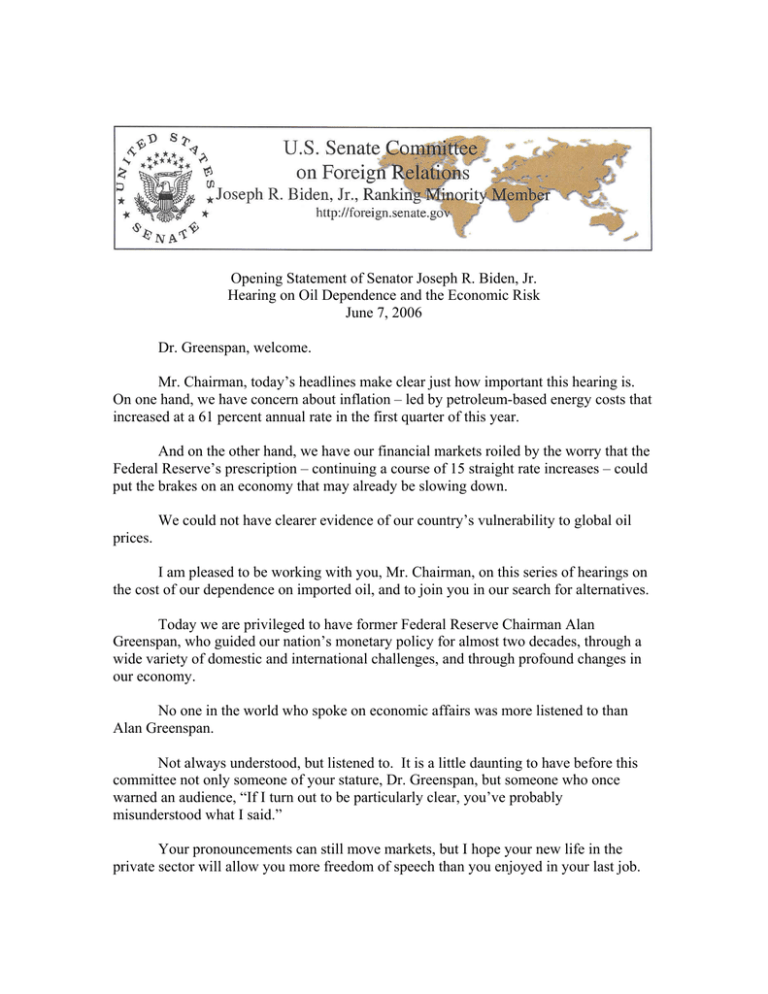
Opening Statement of Senator Joseph R. Biden, Jr. Hearing on Oil Dependence and the Economic Risk June 7, 2006 Dr. Greenspan, welcome. Mr. Chairman, today’s headlines make clear just how important this hearing is. On one hand, we have concern about inflation – led by petroleum-based energy costs that increased at a 61 percent annual rate in the first quarter of this year. And on the other hand, we have our financial markets roiled by the worry that the Federal Reserve’s prescription – continuing a course of 15 straight rate increases – could put the brakes on an economy that may already be slowing down. We could not have clearer evidence of our country’s vulnerability to global oil prices. I am pleased to be working with you, Mr. Chairman, on this series of hearings on the cost of our dependence on imported oil, and to join you in our search for alternatives. Today we are privileged to have former Federal Reserve Chairman Alan Greenspan, who guided our nation’s monetary policy for almost two decades, through a wide variety of domestic and international challenges, and through profound changes in our economy. No one in the world who spoke on economic affairs was more listened to than Alan Greenspan. Not always understood, but listened to. It is a little daunting to have before this committee not only someone of your stature, Dr. Greenspan, but someone who once warned an audience, “If I turn out to be particularly clear, you’ve probably misunderstood what I said.” Your pronouncements can still move markets, but I hope your new life in the private sector will allow you more freedom of speech than you enjoyed in your last job. 2 We will need candor, and clarity, if we are to understand and confront the challenges before us. The last time you appeared before this Committee, we were facing the Peso crisis, the first wave of international financial crises in the late 1990's. The topic of today’s hearing presents threats of a similar magnitude to our economy, and to our security. Today we are concerned about fundamentals, about the fuels that make our economy run, and about threats to our economic security because we do not control access to those fuels. And we are looking for ways we can move to more secure sources in the near future. Our failure to set a national energy policy to reduce our consumption of oil has handcuffed our foreign policy and weakened us economically. Global oil consumption—especially with the extremely rapid modernization of countries like China and India – is growing faster than the discovery and development of new supplies. Supply has never been so tight relative to demand. We now live in a world that consumes 85 million barrels of oil every day. It’s an enormous amount. Meanwhile, worldwide spare production capacity has shrunk to just 2 percent of demand. And that means the slightest thing – a terrorist attack in Saudi Arabia, tough talk from Iran, violence in Nigeria, or even a bad storm in our own Gulf region – can cause oil markets to panic. Here in the Foreign Relations Committee, we deal every day with the foreign policy implications of our dependence on imported fossil fuels. Most obviously, there are our complex relationships with what Michael Mandelbaum and others have called the “Axis of Oil,” the oil-rich regimes around the world. This dependence has a pernicious effect on our foreign policy. It literally helps to fuel the terrorism we are fighting, because some of dollars we spend on crude oil wind up in the pockets of radicals. It limits our options and limits our leverage in dealing with national security threats, because oil rich countries can stand up to us, and oil dependent countries are afraid to stand with us. And it undercuts our hopes for advancing democracy and freedom, because repressive regimes, swimming in a sea of high-priced oil, can resist pressure to reform. 3 To cite just one example, Iran’s most recent threats to disrupt oil exports – as a direct response to our attempts to deal with their nuclear ambitions – was immediately translated into an increase in oil prices – a jump to $73 a barrel. Not just economic forces, but political conflicts, drive this market. We are here today to hear from Dr. Greenspan about the economic impact of oil and gas prices. During his long tenure as Chairman of the Federal Reserve, oil and gas prices spiked dangerously several times. Dr. Greenspan has repeatedly warned us about the potential impact of those fundamental energy prices on inflation as they worked their way through the economy, as well as their potential to slow economic activity as consumers and producers moved limited dollars from other sectors to cover energy costs. In your last Monetary Report to Congress last year, Dr. Greenspan, you placed significant stress on the potential problems that could arise from the jump in energy prices. You reported then that the impact they could have on consumer spending – the hit to the average American’s pocketbook – would depend on how much incomes were growing. On that front, the news is not encouraging. The latest reports from the job market show yet another disappointingly small increase in the number of Americans finding work, and the persistence of very troubling stagnation in wages. Something is wrong, this far into an economic recovery, when the job picture is this weak. Wages are still flat – up just a penny an hour. That’s forty cents for a forty hour work week. And the cost of living – including the cost of gasoline, and everything made and transported with petroleum – continues to grow faster than incomes. The cost of gasoline went up over two cents a gallon last week. That’s over forty cents more for a 20 gallon tank of gas. That means that higher prices for gasoline really hurt real families. Gas is pretty much a fixed cost for the average American family who can’t switch cars or move closer to work. For them, this is not an abstract discussion. Here is what the Wall Street Journal wrote last Friday: “Rising Energy Costs Pinch Low-Income Shoppers.” Slow job growth, flat wages – American households are part of the context we need to understand the impact of oil prices. In the bigger picture, our dependence on foreign oil feeds a cycle of dependence on foreign lenders to finance it. 4 Our trade deficit through March this year was $192 billion – that’s 6 percent of our economy. Thirty percent of that deficit – $65 billion – was the cost of our petroleum imports. That number could grow to $100 billion this year. To finance that trade deficit, we are borrowing from other countries. The supply of our debt will eventually outrun demand. As we are already seeing, that means a weaker dollar, making importing oil – and the thousands of other consumer goods from cars to computers – even more expensive. Until we do something about our dependence on imported oil we will not be in control of our economic security. We can restore our energy security by reducing our consumption of oil. We can make the most progress, in the shortest amount of time if we focus on the fuel we put in our cars and trucks. Seventy percent of the oil we consume is used in transportation. We can immediately begin reduce our oil consumption by switching to fuels we can grow at home and making better, more efficient use of the energy we consume. First we need to make sure we’re all driving good cars by increasing fuel efficiency and requiring that every car sold in the US is a flexible fuel vehicle or FFV – that can run on alternative fuel like E85 – an 85 percent ethanol fuel blend. Second, we need to make sure that we’re using good fuel by requiring that major oil companies add alternative fuel pumps to at least half of their gas stations. Finally, we need to put in place the market and infrastructure for alternative fuels so that as new, more advanced fuel technology – like cellulosic (switchgrass) ethanol – becomes widely available we have the cars and pumps for it ready to go. We have asked you here today to help us understand better the shape we are in today, and to draw on your experience to understand how we can manage the future. I look forward to your statement, Dr. Greenspan, and to a discussion of these and other issues before us. Thank you, Mr. Chairman.
